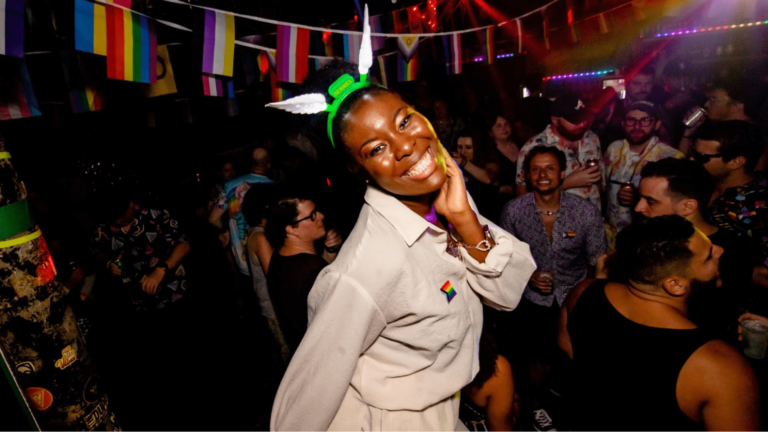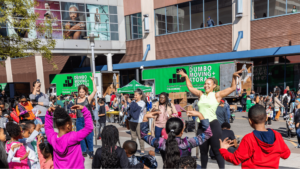As an event organizer, you already know that exceptional event brands who partner with equally exceptional sponsors are a match made in heaven.
But did you know there are different types of event sponsorship?
Understanding event sponsorships’ unique needs and objectives can help you stand out and build meaningful relationships with sponsors.
How do we know this?
Eventbrite has worked with event organizers of all sizes, from big music festivals to business conferences and small workshops. From this experience, we know that great sponsors are worth their weight in gold.
In this article, we’ll discuss the different types of event sponsor packages available, provide expert tips, and give you some real-world examples.
Why is event sponsorship important?
What are the 4 types of sponsorship programs for events?
Real-world examples of sponsorship for events
How do you find the perfect sponsor for your event?

Why is event sponsorship important?
Event sponsorship is a tool for success.
For event organizers, sponsorship helps take your event to the next level by enhancing the quality of your event through increased financial support or by expanding your reach and impact.
By partnering with a brand or company, you can tap into their resources or expertise to elevate the event experience and boost visibility.
But hey, don’t think event sponsorship is one-sided.
Event sponsorship also has incredible benefits for brands and companies. By partnering with events, brands can unlock opportunities to reach new audiences and increase their credibility within a niche community of people.
Take, for example, the Dallas Reggae Festival, which offers sponsors ‘red, gold, green, or lion’ packages that include pre-event and on-site recognition in exchange for their support.

What are the 4 types of sponsorship programs for events?
The most common types of sponsor packages for events are financial, in-kind, media, and promotional sponsorship.
However, that’s not to say that all sponsorship programs will fit into one of these boxes.
For example, consider Rolex’s sponsorship with TED Talks. Rolex provided financial contributions to TED Talks in 2007, but they’ve also supported their technological advancements and distribution efforts.
Therefore, the four sponsorship categories below should be used as a guide to help you navigate negotiations for a mutually beneficial partnership and understand what’s reasonable to expect from an investor — not as a strict rule.
Financial event sponsors
Some event sponsors will offer financial support in exchange for promotional access to your event audience.
Financial sponsors usually cover an agreed percentage of your event expenses or offer a set amount of money during the pre-event planning stages to cover charges like:
- Venue rentals
- Headliners or performance fees
- Food and drink expenses
To get a sponsor to show interest in a financial arrangement, you need to convince them they’ll receive a large ROI for their brand. Otherwise, the deal will be too uneven. That’s why financial sponsors are typically on the hunt for their ‘kindred spirit’ event brand — the one whose attendee demographics, values, and interests are a ‘perfect match.’
For example, Rhythm Foundation’s Youth Music Festival event received a financial sponsor package from Breezeline. This partnership allowed Breezeline to target the attendees’ parents during the event by capturing emails, increasing awareness, or encouraging online sign-ups.
Benefits of financial event sponsorship
The most significant advantage of financial event sponsorship is that you can enhance your event experience by:
- Hiring a larger venue to facilitate more people and boost ticket registration numbers
- Incorporating higher-value amenities to increase ticket prices
- Creating more enticing offers to appeal to more popular performers to increase the appeal of your event
Financial event sponsorship also offers you the freedom to be more innovative with your event design — you can expand your event in a way that wouldn’t be possible with tighter budgetary constraints.

In-kind event sponsors
Instead of funding your event, in-kind event sponsors are kind enough to provide goods or services for your event. In-kind event sponsors are like the ‘fairy godmothers’ of sponsors: They take your stress away by making material goods like food, alcohol, and merchandise appear magically.
For instance, an alcohol brand may provide beer and wine for your entire event in exchange for maximum promotional visibility.
Some common examples of an in-kind event sponsor package include:
- Food and beverage donations
- Use of technology or audiovisual equipment for the event
- Supplying event merchandise or promotional materials
Looking to host a virtual or hybrid event but worried an in-kind sponsor wouldn’t be interested? Don’t worry; these types of sponsors aren’t just for live events; they can also support remote gatherings by providing high-value prizes for an online auction or donating streaming technology.
Benefits of in-kind event sponsorship
In-kind sponsorships are a great way of securing valuable goods and services for your event without putting down a direct financial investment.
In-kind event sponsorship also helps with:
- Reducing expenses on material goods and services
- Providing high-quality services at your event, such as high-speed wifi
- Building long-term partnerships with mutually beneficial perks
For instance, if you’re an event organizer that hosts a lot of food events, such as Upstairs NYC, building a long-term partnership with a sponsor, such as a brewery, is likely to be a profitable endeavor.

Promotional event sponsors
Promotional event sponsors are partners who work to raise awareness around your event.
For instance, working closely with social media influencers to promote your event in exchange for free entry or exposure can count as a promotional sponsorship. This is especially true if you’re working with macro-influencers with over 100,000 followers.
Promotional event sponsors could be:
- Community or industry leaders
- Local businesses
- Fellow event organizers
The whole point of working with this type of sponsor is to rally new attendees and convince them (through a trusted source) that your event is ‘unmissable.’ This could involve developing and sharing social media promotional content and publicly advocating for your event.
One of the best sponsorship examples is NFT.NYC, sponsored by massive names in the business industry, such as Forbes and Amazon Web Services. These companies not only provide financial support but also promote NFT. NYC’s event through their platforms and marketing channels to help boost visibility.
Benefits of promotional event sponsorship
Think of promotional event sponsorships in the same way as an investment in stocks — sure, it can pay in the short-term, but the real benefits happen over time, such as:
- Increased brand visibility to a wider audience
- Access to a network of people who are skilled in marketing
- Ability to experiment with different social campaigns without the risk
Promotional event sponsorships increase the likelihood of a first-time ticket buyer becoming a recurring customer. And, as an added perk, by ramping up engagement with your social media posts and exposing your event brand to different groups, you build credibility with your existing audience.
Media event sponsors
Unlike financial and in-kind sponsors that offer aid in your event planning and execution, promotional and media event sponsors only have one goal: to get more eyes on your event. Therefore, many event organizers mistakenly think that media and promotional sponsors are the same thing.
However, while promotional sponsors could include a social media promotion like a TikTok influencer or a fellow event brand, media sponsors focus more on traditional media outlets, like television, radio, or online news channels.
Use a media event sponsor package to:
- Enhance event credibility and authority
- Widen your audience reach
- Build your network for future events
For example, an event venue like House of Yes might look to partner with a media outlet, such as VICE, to sponsor their event, as they both target younger, more liberal audiences.
Benefits of media event sponsorship
Just like promotional event sponsorship, media event sponsorship widens your audience reach and boosts your event brand’s authority by:
- Targeting an established audience base with a high level of trust in the media source you’re partnering with
- Amplifying your brand across different mainstream networks, such as television and radio
- Enhancing the perceived relevance and value of your brand through association with ‘major media networks’
Beyond these benefits, media event sponsorships help you build a network of industry professionals that you can rely on in the future. For instance, if you partner with a radio station and make a good impression, you can use this connection as a testimonial to secure other media collaborations in the future.

Real-world event sponsorship examples
In 2024, sponsorship is evolving. Brands are finally breaking out of the ‘traditional sponsorship model prison’ and looking for new and exciting ways to reach their audience.
They’re on the prowl for event organizers who are constantly pushing the limits of what an ‘event’ can be — the type who knows exactly how to hook attendees and never let them go.
Below are two inspiring examples that prove how successful sponsorships can be when they embrace innovation.
Lollapalooza and Snapchat
Lollapalooza’s collaboration with Snapchat is an excellent event sponsor example where innovative digital engagement takes center stage.
Lollapalooza is a muti-genre, mega-music festival in Chicago. Among other big-name partners, like M&M’s and Bud Light, Snapchat offered the festival financial sponsorship and in-kind and promotional sponsorship.
Most notably, Snapchat created an augmented reality (AR) map on their mobile event app that allowed attendees to navigate through the crowd and a lifesize AR mirror Snap Ghost Tunnel.
ESSENCE Festival and Coca-Cola
Coca-Cola has been a presenting sponsor of the ESSENCE Festival for 28 years, providing all three major forms of support: in-kind, promotional, and financial.
In exchange, the ESSENCE Festival puts Coca-Cola on full display at their event. This includes branding on their microphone stands, event banners, cups, and website — everything attendees can see is colored in red.
Coca-Cola’s long-term support of the ESSENCE Festival is a great event sponsorship example that shows how successful, long-lasting partnerships can emerge when you have a mutually beneficial event sponsorship agreement.

How do you find the perfect sponsor for your event?
Now you know who you’re looking for, it’s time to find the perfect sponsor.
How, you ask? Through the power of strategic planning and targeted outreach.
1. Find sponsors with a similar audience
The first step is to use Eventbrite to find a sponsor with a similar audience.
Use another event organizer as an example — your competitors are a great place to start. Look through their Eventbrite creator page and see which sponsors they’ve worked with before.
Make an ordered list from the most appealing brands to the ones least likely to resonate with your audience.
Now, consider whether they’re a good fit for your event.
2. Look for sponsors whose messaging resonates with your event
The next step is to ensure that the sponsors you choose align with your event brand’s values and ethics. Any brand or company you associate with will impact your target audience’s perception of your brand — so you choose wisely.
Vet your potential brands. Have a look at their messaging and marketing. Are they reaching the same audience as you, or are they likely to alienate them?
We suggest using good ol’ ‘social media stalking.’ Hop onto Instagram and TikTok, pop in some hashtags and sift through comments. Who is interacting with their brand, and what are they saying about it?
Now, get ready to impress your chosen sponsors.
3. Create a sponsorship pitch deck and reach out
The final step in finding a sponsor is to reach out to them with a killer pitch deck.
Keep in mind companies are inundated with messages on social media and email looking for sponsorship deals. To stand out from the crowd, you’ll need to create a pitch deck that highlights your unique value.
Use event data from previous events you’ve hosted, and collect audience demographics from your social media accounts. Prove (through hard evidence) that your event is the ‘event for them’ and that they don’t need to look any further because they’ve found ‘the one.’

Which types of sponsorship will you choose?
Finding your ‘perfect sponsor match’ starts with understanding what type of sponsorship is right for you. Research sponsors’ target audiences, offerings, and values to determine how they could help take your event to the next level.
Would a financial, in-kind, or promotional contribution be the most mutually beneficial, or a combination of all three?
From there, it’s all about gathering accurate, real-time data and presenting it in the most compelling way possible.
Eventbrite makes data analysis and target audience profiling simple. It allows you to leverage insights from your unique event history so you can provide potential event sponsors with irrefutable proof of your greatness.






